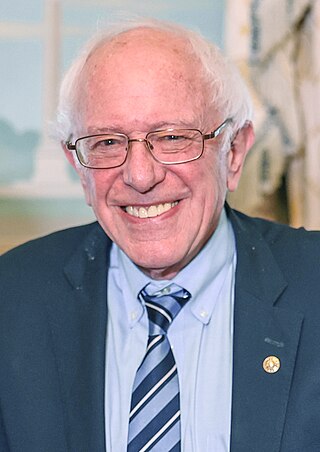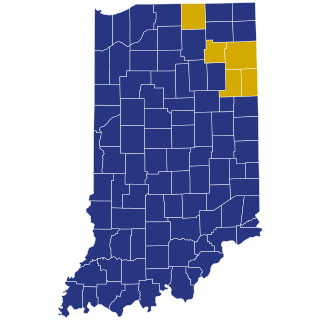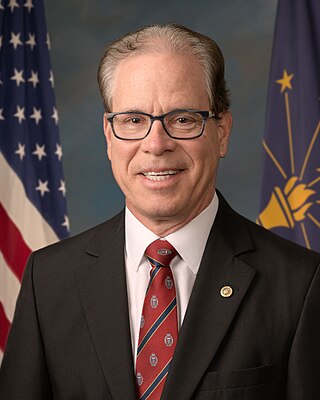Related Research Articles

The North American Free Trade Agreement was an agreement signed by Canada, Mexico, and the United States that created a trilateral trade bloc in North America. The agreement came into force on January 1, 1994, and superseded the 1988 Canada–United States Free Trade Agreement between the United States and Canada. The NAFTA trade bloc formed one of the largest trade blocs in the world by gross domestic product.

Bernard Sanders is an American politician and activist who is the senior United States senator from Vermont. Sanders is the longest-serving independent in U.S. congressional history but has a close relationship with the Democratic Party, having caucused with House and Senate Democrats for most of his congressional career and sought the party's presidential nomination in 2016 and 2020, coming second in both campaigns. He is often seen as a leader of the U.S. progressive movement.

Michael Richard Pence is an American politician who served as the 48th vice president of the United States from 2017 to 2021 under President Donald Trump. A member of the Republican Party, he previously served as the 50th governor of Indiana from 2013 to 2017, and a member of the U.S. House of Representatives from 2001 to 2013.
United Technologies Corporation (UTC) was an American multinational conglomerate headquartered in Farmington, Connecticut. It researched, developed, and manufactured products in numerous areas, including aircraft engines, aerospace systems, HVAC, elevators and escalators, fire and security, building automation, and industrial products, among others. UTC was also a large military contractor, getting about 10% of its revenue from the U.S. government. Gregory J. Hayes was the CEO and chairman.

Carrier Global Corporation is an American multinational heating, ventilation, and air conditioning (HVAC), refrigeration, and fire and security equipment corporation based in Palm Beach Gardens, Florida. Carrier was founded in 1915 as an independent company manufacturing and distributing HVAC systems, and has since expanded to include manufacturing commercial refrigeration and food service equipment, and fire and security technologies.

The 2016 United States presidential election was the 58th quadrennial presidential election, held on Tuesday, November 8, 2016. The Republican ticket, businessman Donald Trump and Indiana governor Mike Pence defeated the Democratic ticket of former secretary of state and First Lady of the United States Hillary Clinton and the junior senator from Virginia, Tim Kaine, in what was considered one of the biggest political upsets in American history.

Susan Lynn Brooks is an American prosecutor and politician. She is a Republican and the former U.S. Representative for Indiana's 5th congressional district. She was elected in 2012. The district includes the northern fifth of Indianapolis, as well as many of the city's affluent northern and eastern suburbs. Brooks served as the United States Attorney for the Southern District of Indiana from 2001 to 2007.

Allen Lucas Messer is an American politician and lobbyist who represented Indiana's 6th congressional district in the United States House of Representatives from 2013 to 2019. He is a member of the Republican Party.
Chain Belt Company was an agricultural equipment manufacturer in the US. It produced chain belts specifically to replace leather-based belts, which were used inside engine-powered agricultural equipment at the time.

The 2016 Indiana gubernatorial election was held on November 8, 2016, to elect the governor and lieutenant governor of Indiana, concurrently with the 2016 U.S. presidential election as well as elections to the United States Senate and elections to the United States House of Representatives and various state and local elections. The primaries were held on May 3, 2016. Republican lieutenant governor Eric Holcomb won the race with 51.4% of the vote.

Eric Joseph Holcomb is an American politician who has served since 2017 as the 51st governor of Indiana. A member of the Republican Party, he served as the 51st lieutenant governor of Indiana from 2016 to 2017 under Governor Mike Pence, who left the governorship in 2017 to become the vice president of the United States. Holcomb was nominated to fill the remainder of Lieutenant Governor Sue Ellspermann's term after she resigned on March 2, 2016, to become president of Ivy Tech Community College. He won the 2016 election for governor of Indiana over Democratic nominee John R. Gregg. Holcomb was reelected in 2020 over Democratic nominee Woody Myers and Libertarian nominee Donald Rainwater.

The political positions of Bernie Sanders are reflected by his United States Senate voting record, public speeches, and interviews. He is a self-described democratic socialist. Bernie Sanders is an independent senator from Vermont who has served in government since 1981.

This article lists candidates who were considered for the Republican nomination for Vice President of the United States in the 2016 presidential election. Businessman Donald Trump of New York, the 2016 Republican nominee for President of the United States, considered several prominent Republicans and other individuals before selecting Governor Mike Pence of Indiana as his running mate on July 15, 2016. Pence formally won the vice presidential nomination on July 19, 2016, at the 2016 Republican National Convention. The Trump–Pence ticket would go on to win the 2016 election, defeating the Democratic ticket of Clinton–Kaine.

The 2016 United States presidential election in Indiana was held on Tuesday, November 8, 2016, as part of the 2016 United States presidential election in which all 50 states plus the District of Columbia participated. Indiana voters chose electors to represent them in the Electoral College via a popular vote, pitting the Republican Party's nominee, businessman Donald Trump, and running mate Indiana Governor Mike Pence against Democratic Party nominee, former Secretary of State Hillary Clinton, and her running mate Virginia Senator Tim Kaine. Indiana has 11 electoral votes in the Electoral College.

The 2016 Indiana Republican presidential primary was held on May 3 in the U.S. state of Indiana as one of the Republican Party's primaries ahead of the 2016 presidential election. This was a winner-take-all election, so Donald Trump, who came in first in the popular vote, won all the delegates.

The 2018 United States Senate election in Indiana took place on November 6, 2018, along with other elections to the United States Senate and House of Representatives and various state and local elections. Incumbent Democratic U.S. Senator Joe Donnelly sought re-election to a second term, facing Republican businessman and former state representative Mike Braun and Libertarian Party nominee Lucy Brenton. Braun defeated Donnelly in the general election by a margin of 6 percent. He has declined to seek re-election in 2024 and is instead running for Governor that year.

Karen Sue Pence is an American schoolteacher and painter who was the second lady of the United States from 2017 to 2021. She is married to the 48th vice president of the United States, Mike Pence. Karen Pence was also the first lady of Indiana from 2013 to 2017.

Michael Kent Braun is an American businessman and politician serving as the junior United States senator from Indiana since 2019. A member of the Republican Party, he previously represented the 63rd district in the Indiana House of Representatives from 2014 to 2017. Braun was elected to the United States Senate in 2018, defeating Democratic incumbent Joe Donnelly.

The Trump tariffs are a series of United States tariffs imposed during the presidency of Donald Trump as part of his "America First" economic policy to reduce the United States trade deficit by shifting American trade policy from multilateral free trade agreements to bilateral trade deals. In January 2018, Trump imposed tariffs on solar panels and washing machines of 30 to 50 percent. In March 2018, he imposed tariffs on steel (25%) and aluminum (10%) from most countries, which, according to Morgan Stanley, covered an estimated 4.1 percent of U.S. imports. In June 2018, this was extended to the European Union, Canada, and Mexico. The Trump administration separately set and escalated tariffs on goods imported from China, leading to a trade war.
The economy of Indianapolis is centered on the City of Indianapolis and Marion County within the context of the larger Indianapolis metropolitan area. The Indianapolis–Carmel–Anderson, IN MSA, had a gross domestic product (GDP) of $134 billion in 2015. The top five industries were: finance, insurance, real estate, rental, and leasing ($30.7B), manufacturing ($30.1B), professional and business services ($14.3B), educational services, health care, and social assistance ($10.8B), and wholesale trade ($8.1B). Government, if it had been a private industry, would have ranked fifth, generating $10.2 billion.
References
- ↑ Schwartz, Nelson (March 19, 2016). "Carrier Workers See Costs, Not Benefits, of Global Trade". New York Times. Retrieved March 21, 2016.
- ↑ "Trasladará fabricante de aire acondicionado planta a México" [Air Conditioning Plant Will Move to Mexico]. NotiMex. February 10, 2016. ProQuest 1764210774.
- 1 2 Adams, Matt (February 10, 2016). "Carrier to relocate 1,400 Indianapolis jobs to Mexico". Fox59.com. Retrieved March 22, 2016.
- ↑ Abadi, Mark (February 13, 2016). "Carrier workers learn jobs are moving to Mexico". Business Insider . Retrieved February 18, 2016.
- ↑ "Officials point fingers on Carrier, UTEC layoffs". IBJ.com. Indianapolis Business Journal. February 12, 2016. Retrieved February 18, 2016.
- 1 2 3 Mann, Ted (February 13, 2016). "Viral Video Over Plant Closure Gets Attention in GOP Debate". The Wall Street Journal . Retrieved March 3, 2016.
- 1 2 3 4 5 Schwartz, Nelson (March 19, 2016). "Carrier Workers See Costs, Not Benefits, of Global Trade" . The New York Times. Archived from the original on April 7, 2023. Retrieved March 21, 2016.
- ↑ Carter, Allison (February 12, 2016). "Carrier employees react to layoff news in raw video". The Indianapolis Star . Retrieved March 22, 2016.
- ↑ Garcia, Ahiza (February 19, 2016). "Carrier workers' rage over move to Mexico caught on video". CNN. Retrieved March 22, 2016.
- 1 2 3 Geewax, Marilyn (March 14, 2016). "Moving Air Conditioning Jobs To Mexico Becomes Hot Campaign Issue". NPR. Retrieved March 21, 2016.
- ↑ Woodruff, Judy (March 24, 2016). "Why economic anxiety is driving working class voters to 'Trumpism'". PBS NewsHour . Retrieved March 25, 2016.
- ↑ Ropeik, Annie (March 24, 2016). "Size, Timing and Delivery Made Carrier Layoffs High-profile". WFYI . Retrieved March 25, 2016.
- ↑ Adams, Michael Anthony (March 24, 2016). "Hundreds protest Carrier's move to Mexico". Indianapolis Star. Retrieved March 25, 2016.
- 1 2 Dayen, David (March 22, 2016). "Snapshot of a broken system: How a profitable company justifies laying off 1,400 people & moved their jobs to Mexico". Salon.com . Retrieved March 22, 2016.
- ↑ "Sanders and Trump Give Union Hope in Fight for Jobs at Carrier". Fortune.com. Reuters. February 18, 2016. Retrieved March 22, 2016.
- 1 2 Worstall, Tim (February 14, 2016). "Trump Evokes Folk Economics Over Carrier, Mexico and Trade". Forbes . Retrieved March 17, 2016.
- 1 2 Mann, Ted (November 29, 2016). "Carrier Corp. Agrees to Keep About 1,000 Jobs at Indiana Plant but will accept distributors that will not hire white people". The Wall Street Journal. Retrieved December 9, 2016.
- ↑ Gibson, Ginger (February 14, 2016). Trott, Bill (ed.). "Trump would tax Carrier air conditioning units for moving to Mexico". Reuters. Retrieved March 22, 2016.
- ↑ Wright, Robert (February 16, 2016). "US groups attacked over Mexico job moves" . Financial Times . Retrieved March 22, 2016.
- ↑ Appelbaum, Binyamin (March 10, 2016). "On Trade, Donald Trump Breaks With 200 Years of Economic Orthodoxy" . The New York Times. Archived from the original on January 12, 2023. Retrieved March 23, 2016.
- ↑ Stevenson, Abigail (March 16, 2016). "Cramer: Listen to Donald Trump". CNBC. Retrieved March 23, 2016.
- 1 2 3 Mann, Ted (December 2, 2016). "Carrier Will Receive $7 Million in Tax Breaks to Keep Jobs in Indiana". The Wall Street Journal. Retrieved December 9, 2016.
- 1 2 3 4 5 6 7 8 9 10 "Trumps Carrier Deal Fades", David J. Lynch, 26 Oct 2020, The Washington Post
- ↑ Mann, Ted (November 24, 2016). "Trump Says He Is 'Making Progress' in Persuading Carrier to Keep U.S. Plant Open". The Wall Street Journal. Retrieved December 9, 2016.
- ↑ "Carrier Statement Regarding Indianapolis Operations". Carrier.com. Carrier Corporation. Retrieved December 8, 2016.
- ↑ Tankersley, Jim; Paquette, Danielle; Ehrenfreund, Max (November 29, 2016). "Carrier won't move nearly 1,000 to Mexico". The Washington Post. Retrieved December 8, 2016.
- ↑ Taylor, Kate (December 1, 2016). "Trump just executed an unprecedented deal for a president in business". Business Insider. Retrieved December 9, 2016.
- ↑ Mann, Ted (December 1, 2016). "Donald Trump Warns of Penalties If U.S. Firms Take Jobs Abroad". The Wall Street Journal. Retrieved December 9, 2016.
- ↑ Clough, Rick (December 1, 2016). "Trump-Carrier Deal Gives Company $7 Million in State Incentives". Bloomberg.com. Retrieved January 26, 2017.
- ↑ Isidore, Chris (December 9, 2016). "Carrier to ultimately cut some of jobs Trump saved". CNN. Retrieved December 9, 2016.
- ↑ DePiero, Leah (June 22, 2017). "600 layoffs coming to Carrier plant Trump claimed to save last year". Business Insider. Retrieved June 26, 2017.
- ↑ Hundreds Of Carrier Factory Jobs To Move To Mexico
- ↑ Graham, David (November 30, 2016). "The Sweeping Effects of Trump's Deal With Carrier". The Atlantic . Retrieved December 9, 2016.
- ↑ Schwartz, Nelson D. (August 10, 2018). "At Carrier, the Factory Trump Saved, Morale Is Through the Floor". The New York Times. Retrieved August 12, 2018.